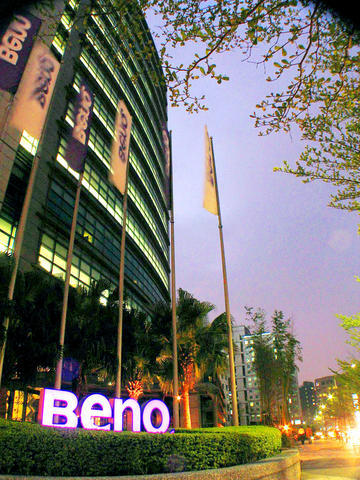In December 2001, over 100 reporters from around the world gathered at Suzhou, Jiangsu Province, to witness the birth of BenQ brand at its China headquarters.
At the time, Taipei-based BenQ Corp (明基) chairman Lee Kun-yao (李焜耀) never thought the company would one day have to say goodbye to the brand business.
On April 25, Lee made a surprising announcement at an investor conference in Taipei, saying that the consumer-electronics maker would spin off its brand operation in September, allowing the company to focus on original design manufacturing (ODM).

PHOTO: EPA
"It is going back to its roots after all," said Allan Pu (卜正倫), an analyst with SinoPac Securities Corp (建華證券).
BenQ spun off from parent Acer Inc in 1984 to become a stand-alone, original equipment manufacturing business. Back then the company was known as Acer Peripherals Inc.
In 1991, the company moved to the next level by venturing into ODM services, had an initial public offering in 1996 and changed its name to Acer Communications & Multimedia Inc in July 2000.
But in a bid to further differentiate itself from Acer, the company in 2002 adopted the BenQ name -- which stands for the company slogan ``bringing enjoyment and quality to life'' -- thus completing the switch from contract manufacturer to brand maker.
Since then, BenQ's road has been a bumpy one. Its shares closed at NT$13.3 on Friday, compared with a record NT$74.30 in April 2000.
"Creating a world-class brandname is an uphill battle. BenQ failed once and the brand now needs further reconstruction," Pu said, adding that SinoPac had stopped tracing BenQ because of its poor performance.
The failure referred to BenQ's takeover of Siemens AG's money-losing handset unit in 2005, which put BenQ in the red with six straight first-quarter losses.
BenQ said last September it would stop funding the German mobile-phone subsidiary, which is now being liquidated.
In September, BenQ will be renamed Jia Da Corp (
It will be easier for BenQ to spin off its brand into an ODM, because the scale of the brand unit will be much smaller after it has disposed of the Siemens handsets, Lee told investors last week.
The spun-off brand unit will retain the BenQ Corp name and initially will be 100 percent owned by Jia Da. Lee said there are plans to attract strategic investors to the brand unit, with Jia Da's stakeholdings in the new BenQ to decrease to 20 percent within five years.
Industry watchers remained skeptical on the spin off project, saying it will take some time to assess its real impact.
"Unlike Acer and Wistron Corp (
In 2001, Acer, the world's No. 3 personal computer maker, spun off its contract manufacturing and design operations into Wistron, an individual outfit which was listed in 2003.
Both companies differ in management and operations, with Acer solely carrying on a high-flying brand business.
The spinoff of the BenQ brand has raised doubts as to whether Lee will finally say goodbye to the brand for good.
The road ahead might be a thorny one, but looking back, the 55-year-old Lee said he doesn't have any regrets.
"The BenQ brand will continue its mission as it is now a household name in China and Taiwan," he said. "One day it will become the pride of the Chinese-speaking world."

Sweeping policy changes under US Secretary of Health and Human Services Robert F. Kennedy Jr are having a chilling effect on vaccine makers as anti-vaccine rhetoric has turned into concrete changes in inoculation schedules and recommendations, investors and executives said. The administration of US President Donald Trump has in the past year upended vaccine recommendations, with the country last month ending its longstanding guidance that all children receive inoculations against flu, hepatitis A and other diseases. The unprecedented changes have led to diminished vaccine usage, hurt the investment case for some biotechs, and created a drag that would likely dent revenues and

Macronix International Co (旺宏), the world’s biggest NOR flash memory supplier, yesterday said it would spend NT$22 billion (US$699.1 million) on capacity expansion this year to increase its production of mid-to-low-density memory chips as the world’s major memorychip suppliers are phasing out the market. The company said its planned capital expenditures are about 11 times higher than the NT$1.8 billion it spent on new facilities and equipment last year. A majority of this year’s outlay would be allocated to step up capacity of multi-level cell (MLC) NAND flash memory chips, which are used in embedded multimedia cards (eMMC), a managed

CULPRITS: Factors that affected the slip included falling global crude oil prices, wait-and-see consumer attitudes due to US tariffs and a different Lunar New Year holiday schedule Taiwan’s retail sales ended a nine-year growth streak last year, slipping 0.2 percent from a year earlier as uncertainty over US tariff policies affected demand for durable goods, data released on Friday by the Ministry of Economic Affairs showed. Last year’s retail sales totaled NT$4.84 trillion (US$153.27 billion), down about NT$9.5 billion, or 0.2 percent, from 2024. Despite the decline, the figure was still the second-highest annual sales total on record. Ministry statistics department deputy head Chen Yu-fang (陳玉芳) said sales of cars, motorcycles and related products, which accounted for 17.4 percent of total retail rales last year, fell NT$68.1 billion, or

In the wake of strong global demand for AI applications, Taiwan’s export-oriented economy accelerated with the composite index of economic indicators flashing the first “red” light in December for one year, indicating the economy is in booming mode, the National Development Council (NDC) said yesterday. Moreover, the index of leading indicators, which gauges the potential state of the economy over the next six months, also moved higher in December amid growing optimism over the outlook, the NDC said. In December, the index of economic indicators rose one point from a month earlier to 38, at the lower end of the “red” light.